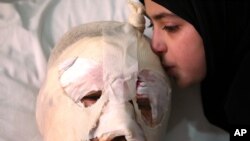BEIRUT —
Deadly al-Qaida suicide bombings and rocket attacks on border towns - all tied to the raging civil war in Syria - are deepening sectarian divisions in Lebanon. Religious hardliners are benefiting.
Two weeks ago, the town of Hermel, a Shia Muslim community in the Bekaa Valley close to the Syrian border, was struck for the first time in its history by a suicide bomber. The explosion killed five people and wounded another 40.
Thirty-year-old Amel Mourkada was working in a photo shop and at first thought the blast was a gas explosion.
She says she does not remember hearing an explosion, she just remembers everything collapsing on her.
Mourkada nearly lost an eye, her nose was fractured in three places and her right hand permanently damaged. She is now recovering.
She says those responsible for the attack do not know God or religion or anything at all.
Saturday, another suicide bomb hit the town, this time three died and 23 were wounded. The attacks are inflaming sectarian anger. Shia opinion in the Bekaa Valley is hardening -- as it is in south Beirut, which has been blasted by a series of bombs since July, the latest on January 21 killing five and wounding hundreds.
Lebanon’s militant Shia movement, Hezbollah, has become deeply involved in the Syrian civil war on the side of President Bashar al-Assad, an adherent of the Alawite sect, an offshoot of Shia Islam. Initially, many Lebanese Shia doubted the wisdom of that involvement.
When young Lebanese Shia fighters started to return in body bags several months ago, some people in Hermel questioned why Hezbollah was fighting in Syria, arguing the real enemy is Israel.
Mohammed Alaw, a 50-year-old high school teacher, was one of those critics, but says he and many others have changed their minds.
He says all the people who condemned or did not agree with Hezbollah going into Syria have changed their minds because of the criminal acts taking place in many parts of Lebanon, especially in the Shi'ite communities.
And Alaw says many of his older students are joining Hezbollah.
Sectarian communities across Lebanon feel besieged. Episodic fighting in the northern Lebanese seaport of Tripoli between pro-Assad and pro-rebel factions, the suicide bombings on Shia neighborhoods and border violence are polarizing the country. The suicide bombings in Hermel will not help. Responsibility for both has been claimed by Jabhat al-Nusra, an offshoot of the Sunni terrorist group al-Qaida.
Lebanon’s Sunni Muslims are also hardening their opinion against their Shia neighbors.
Recently Saad Hariri, the leader of the mainly Sunni March 14th bloc of political parties, offered in principle to enter a national unity government that would include Hezbollah. Many Sunni Muslims were outraged, including Abu al-Bara, a Sunni sheik in Tripoli.
Abu says he and other Sunnis now hate Hariri because he is willing to cooperate despite the deaths of many Sunnis at the hands of Hezbollah.
Lebanon’s besieged sectarian communities share one thing - a sense of foreboding.
Two weeks ago, the town of Hermel, a Shia Muslim community in the Bekaa Valley close to the Syrian border, was struck for the first time in its history by a suicide bomber. The explosion killed five people and wounded another 40.
Thirty-year-old Amel Mourkada was working in a photo shop and at first thought the blast was a gas explosion.
She says she does not remember hearing an explosion, she just remembers everything collapsing on her.
Mourkada nearly lost an eye, her nose was fractured in three places and her right hand permanently damaged. She is now recovering.
She says those responsible for the attack do not know God or religion or anything at all.
Saturday, another suicide bomb hit the town, this time three died and 23 were wounded. The attacks are inflaming sectarian anger. Shia opinion in the Bekaa Valley is hardening -- as it is in south Beirut, which has been blasted by a series of bombs since July, the latest on January 21 killing five and wounding hundreds.
Lebanon’s militant Shia movement, Hezbollah, has become deeply involved in the Syrian civil war on the side of President Bashar al-Assad, an adherent of the Alawite sect, an offshoot of Shia Islam. Initially, many Lebanese Shia doubted the wisdom of that involvement.
When young Lebanese Shia fighters started to return in body bags several months ago, some people in Hermel questioned why Hezbollah was fighting in Syria, arguing the real enemy is Israel.
Mohammed Alaw, a 50-year-old high school teacher, was one of those critics, but says he and many others have changed their minds.
He says all the people who condemned or did not agree with Hezbollah going into Syria have changed their minds because of the criminal acts taking place in many parts of Lebanon, especially in the Shi'ite communities.
And Alaw says many of his older students are joining Hezbollah.
Sectarian communities across Lebanon feel besieged. Episodic fighting in the northern Lebanese seaport of Tripoli between pro-Assad and pro-rebel factions, the suicide bombings on Shia neighborhoods and border violence are polarizing the country. The suicide bombings in Hermel will not help. Responsibility for both has been claimed by Jabhat al-Nusra, an offshoot of the Sunni terrorist group al-Qaida.
Lebanon’s Sunni Muslims are also hardening their opinion against their Shia neighbors.
Recently Saad Hariri, the leader of the mainly Sunni March 14th bloc of political parties, offered in principle to enter a national unity government that would include Hezbollah. Many Sunni Muslims were outraged, including Abu al-Bara, a Sunni sheik in Tripoli.
Abu says he and other Sunnis now hate Hariri because he is willing to cooperate despite the deaths of many Sunnis at the hands of Hezbollah.
Lebanon’s besieged sectarian communities share one thing - a sense of foreboding.












